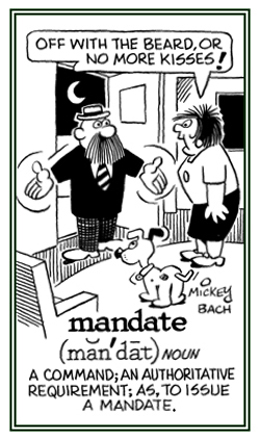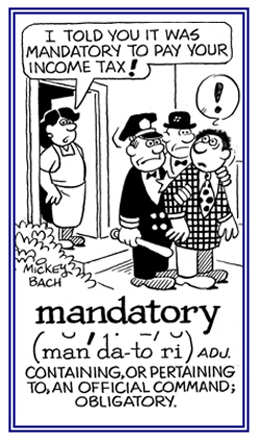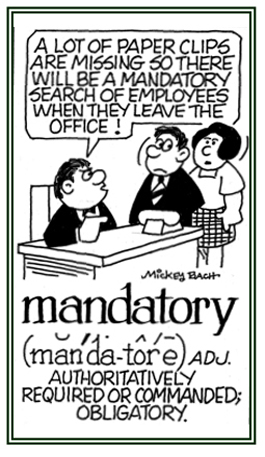managerial (adjective), more managerial, most managerial
Referring to a regulation or an administration: Susan was surprised when the director of the company gave her a managerial job, which required about the same performance as the supervisor.
Mandamus. (Latin word)
Translation: "We command."
A higher court's writ conveying orders to a lower court. Any court order issued to enforce performance of a public duty.
An individual who receives or holds an order or commission to do something; to act for another person: The mandatary, who was Grace’s attorney, represented her during the court session, supporting and presenting facts in her favor during the divorce case.
1. An authoritative order, instruction, or command to do something by law: The mandate of the governor of the state required more roads to be built.
3. A command from a superior court or official to a lower one: The mandate from the judge required Gerald to appear at the local judiciary body next week.
4. Etymology: from Latin mandatum, "commission, order" and mandare, "to order, to commit to one's charge"; literally, "to give into one's hand"; probably from manus, "hand" + dare, "to give".

© ALL rights are reserved.

© ALL rights are reserved.
Go to this Word A Day Revisited Index
Citizens of the town were told that work on repairing the bridge would start as soon as an official mandate was received by the contractors.
2. A command or authorization to act in a particular way on a public issue given by the electorate to its representative: The President had a clear mandate to end the war.3. A command from a superior court or official to a lower one: The mandate from the judge required Gerald to appear at the local judiciary body next week.
4. Etymology: from Latin mandatum, "commission, order" and mandare, "to order, to commit to one's charge"; literally, "to give into one's hand"; probably from manus, "hand" + dare, "to give".


Go to this Word A Day Revisited Index
so you can see more of Mickey Bach's cartoons.
mandatory (adjective), more mandatory, most mandatory
1. Referring to an authoritatively ordered or compulsory requirement: At Jim's high school, it is a mandatory rule that all students take two years of math.
2. Pertaining to, of the nature of, or containing a command: Since wearing a helmet while riding a bicycle is very sensible, it should be a mandatory requirement that everyone wear one.
3. In law, permitting no option; not to be disregarded or modified: There was a mandatory clause in the contract that Al signed when he was accepted as an employee which specified that he would need to know how to use a computer and have an e-mail address.

© ALL rights are reserved.

© ALL rights are reserved.
Go to this Word A Day Revisited Index
2. Pertaining to, of the nature of, or containing a command: Since wearing a helmet while riding a bicycle is very sensible, it should be a mandatory requirement that everyone wear one.
3. In law, permitting no option; not to be disregarded or modified: There was a mandatory clause in the contract that Al signed when he was accepted as an employee which specified that he would need to know how to use a computer and have an e-mail address.


Go to this Word A Day Revisited Index
so you can see more of Mickey Bach's cartoons.
1. A planned and regulated movement or placement of troops, warships, etc.: Maneuvers are a series of tactical exercises usually carried out in an area by large bodies of troops which are simulating the conditions of war.
2. An act or instance of changing the direction of a moving ship, aircraft, vehicle, etc., as required: The pilot was preparing his airplane for take off by making a maneuver in the right airport area.
3. An adroit move, skillful proceeding, etc.; especially, as characterized by craftiness: Henry was able to make creative political maneuvers during the debate on TV.

© ALL rights are reserved.
Go to this Word A Day Revisited Index
2. An act or instance of changing the direction of a moving ship, aircraft, vehicle, etc., as required: The pilot was preparing his airplane for take off by making a maneuver in the right airport area.
3. An adroit move, skillful proceeding, etc.; especially, as characterized by craftiness: Henry was able to make creative political maneuvers during the debate on TV.

Go to this Word A Day Revisited Index
so you can see more of Mickey Bach's cartoons.
A cosmetic treatment of the fingernails, including shaping and polishing: There are many places in the world where manicures are provided by studios or neighborhood individuals.
manicure (verb), manicures; manicured; manicuring
1. To trim, clean, and polish: Henry's wife had an appointment to get her hair done and to get her fingernails and her toenails manicured.
2. To clip or to trim evenly and closely: The gardener's job was to manicure Gertrud's hedge every two weeks during the summer.
2. To clip or to trim evenly and closely: The gardener's job was to manicure Gertrud's hedge every two weeks during the summer.
1. Usually a beautician or someone who specializes in giving treatment of the fingernails; including, shaping and polishing: There are people who go to manicurists regularly for treatment of their fingernails and, sometimes, even for other conditions of their hands.
Someone once wrote that we should remember that only manicurists are literally making money "hand over fists".
2. Etymology: "a person who professionally treats hands and fingernails" which came from French manicure; literally, "the care of the hands"; from Latin manus, "hand" + cura, "care, treatment".
manifest (verb), manifests; manifested; manifesting
1. To show or to demonstrate plainly; to reveal: The prosecutor at the trial was able to manifest evidence that proved the accused was guilty of the crime.
2. To record a ship's list of cargo or passengers it is carrying on a ship or an aircraft: The captain's assistant manifested an invoice of goods that had been brought aboard for transportation to another destination.
3. Etymology: originally, "that which can be seized by the hand"; compounded of Latin manus, "hand" and -festus, "capable of being seized".
2. To record a ship's list of cargo or passengers it is carrying on a ship or an aircraft: The captain's assistant manifested an invoice of goods that had been brought aboard for transportation to another destination.
3. Etymology: originally, "that which can be seized by the hand"; compounded of Latin manus, "hand" and -festus, "capable of being seized".
manifest (adjective), more manifest, most manifest
Referring to something which is clear or obvious to the senses and not hidden: It was certainly a manifest conclusion that Jack was an excellent cook because the dinner consisted of five courses and each one was appetizing and delicious.

© ALL rights are reserved.

© ALL rights are reserved.

© ALL rights are reserved.
Go to this Word A Day Revisited Index



Go to this Word A Day Revisited Index
so you can see more of Mickey Bach's cartoons.
1. An act of showing or demonstrating something: In Bram Stocker’s novel, Dracula is the manifestation of a completely evil, villainous, and ghastly character.
3. An occurrence in which a ghost or spirit of a dead person appears: Some people had the feeling that there were ghostly manifestations in the graveyard when they walked by it late at night.
Eve's voluntary work with the homeless people were a manifestation of her compassionate nature.
2. An indication of the existence, reality, or presence of something: A high fever can be an early manifestation of certain diseases.3. An occurrence in which a ghost or spirit of a dead person appears: Some people had the feeling that there were ghostly manifestations in the graveyard when they walked by it late at night.
manifestly (adverb), more manifestly, mosr manifestly
Characterized by being clear or apparent to the sight or understanding: The decision by the government to lower taxes was manifestly appreciated by its citizens.
A clearness of the sight or the mind; obviously discernible: The manifestness of Mary’s musical talent was quite apparent because she was able to play a piece perfectly after hearing it only once.
A public declaration of principles, policies, or intentions; especially, of a political nature: The politicians of Jack's group couldn’t come to an acceptable manifesto because so many of the members had opposing opinions.
The group that Jim belongs to had a manifesto to focus on helping the poor by making sure they have safe places to stay during the winter.
Related "hand" units: cheiro-, chiro-; Dextro and Sinsitro History; Hands as Objects of Art; Hands: Mechanical Marvels; palm.


